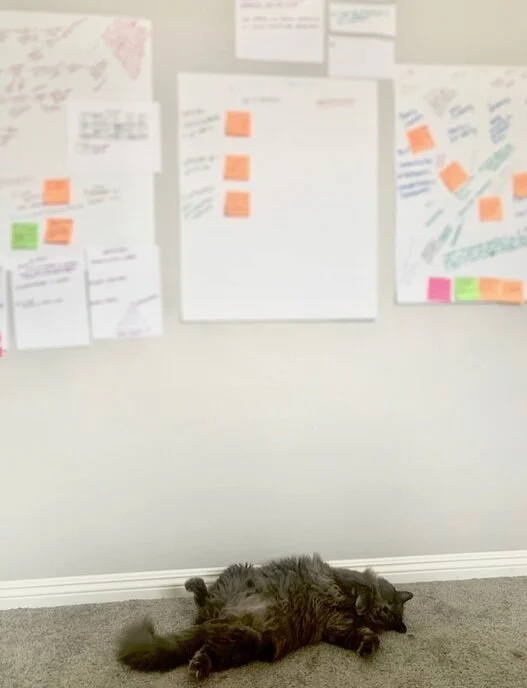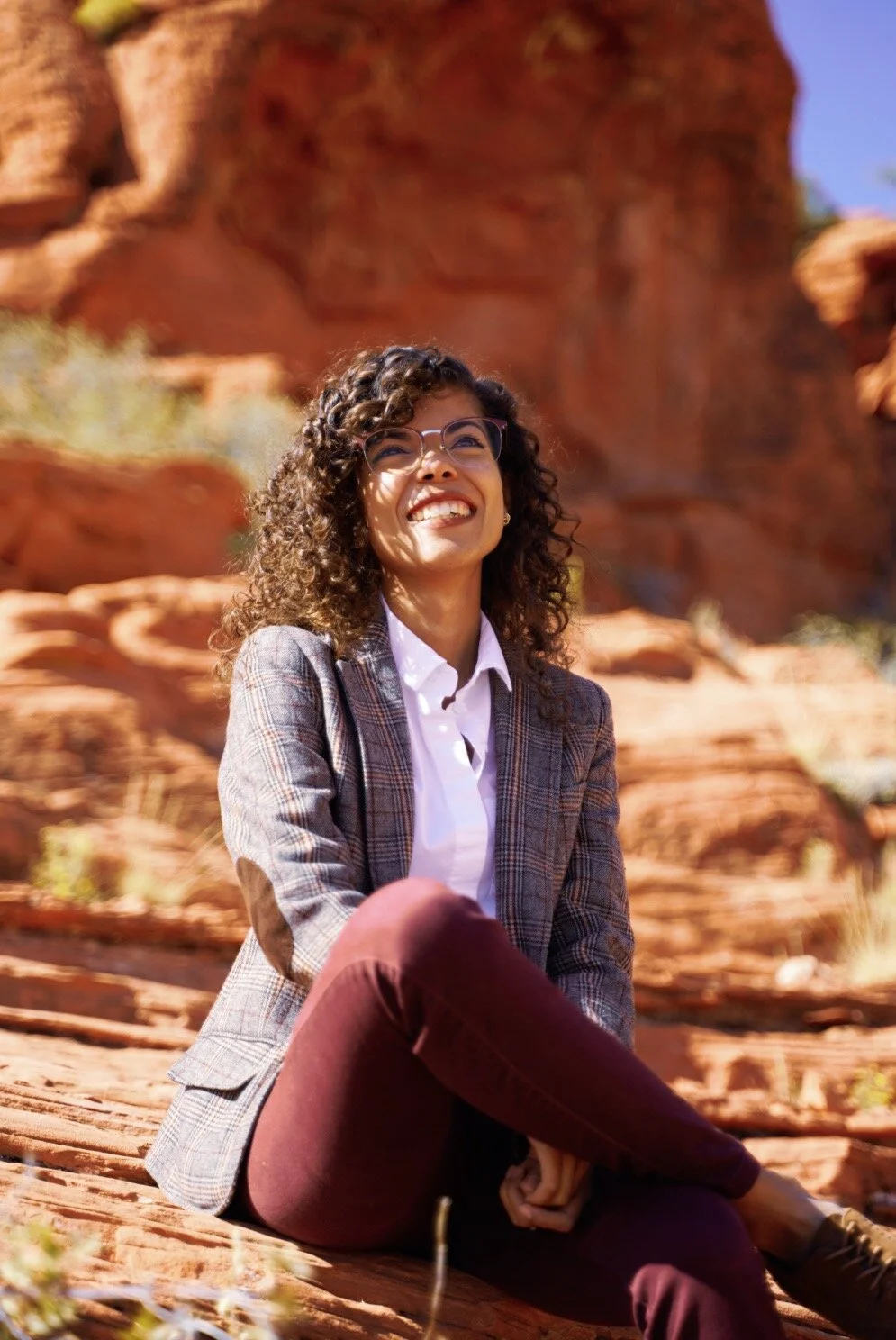Beginning Again, and Again
By Marcela Rodriguez-Campo
Photo/Marcela Rodriguez-Campo.
The question people always seem to ask doctoral candidates is, “how’s writing going?” “Well…”, I stammer through awkward ums and uhs as I throw my hands up in emphatic defeat. I tell them, I abruptly woke up at 2 am one day, ran to my desk, and scribbled a three-page outline of my dissertation findings on a blank page with purple sharpie. Then, I proceeded to mumble Biggie lyrics as I tucked myself back into bed in a frenzied hurry. According to my notes, it was not in fact “all a dream” as the next day I woke up to find a conglomeration of colorful post-its and taped up pages on my brainstorming wall. Luckily, they did manage to make sense, but the point is that writing comes whenever it wants to these days. It comes when it's inconvenient, it can’t be coaxed out or inspired into being, it just does and doesn’t happen every day, but nonetheless every day you have to begin again.
I try to reign back the shrill sound in my voice and take a deep breath, but in all reality to have experienced this pandemic simultaneously as an instructor and a student along with every other identity I carry has been the tug-of-war of my life. Whether it’s the sheer exasperation or the very apparent looming sense of doom that the pandemic has created, the conditions we are currently living under are not what any of us could have ever prepared for. To survive it all, vulnerability has become my pedagogy, the current moment my curriculum. I think about my students, most of whom are first-generation students of color who faced this pandemic head on. Their professors gave them more work they knew what to do with. They became breadwinners. They became unemployed and homeless. Their family members got COVID-19. Their partner lost their job. They witnessed the 8 minutes and 46 seconds that it took the world to realize that George Floyd’s Black life should have mattered. They participated online without WiFi. They recovered from COVID-19 while keeping track of deadlines. They watched the COVID-19 death toll tick into the millions, and the list goes on and on. They have had very little respite, but they have continued fighting each day to stay on track and that should inspire all of us.
In a matter of months, I was or am or might cross the stage for what would be the last time as I complete my doctorate. However, this pandemic and the state of the world has introduced a degree of uncertainty that no one could have ever predicted. Those of us who are graduating during the foreseeable future might never see that stage. For first-generation immigrant graduates, that picturesque moment of standing in our robes, surrounded by our families, flowers in our arms, our family members inevitably hoarding 15 ceremony pamphlets as evidence that our names were indeed called is what many of us might have imagined as the epitome of honoring our families sacrifices. And that moment might never happen (Existential Crisis enters stage left). How do we come to terms with this reality? How do we find new meaning in things that have been rendered meaningless by an unforgiving and relentless litany of crises?
You would think that by now productivity would not be the centerfold of what brings us together, but it’s still the first question we ask of ourselves and our students. What if we made the classroom about community? What if we showed up not for points, but to bear witness to one another’s lives? How much more could we learn about the world and about each other if we taught one another to be vulnerable about all that we do and really do not know? How differently might we learn? I ask these questions as I have watched the entire world find new ways to operate entirely, and find hope that this might extend into our classrooms.
Over the last year I have been in (virtual) community with 50 aspiring teacher candidates, undergraduates who are prospective educators. Somehow without ever having met in person, we found family in each other. We created a space where we could each show up as our frenzied messes, unfinished and incomplete mosaics of something entirely unexpected. Having to take the scraps of what 2020 has left us and make do. What we have created is a jagged and slumped, an unmiraculous abstract thing of a thing that through squinted eyes we might just be able to make meaning of. Each week on Zoom we held up our collages of the pieces of us we have managed to retain in 2020, is this something? It’s got to be something. Through tears and mostly laughter, we reminded each other that there was still something quite beautiful in each of us. Despite such great odds that would have kept my students from showing up each week, they did. We did. We showed up for each other. We talked through the heartbreaks that 2020 brought us, the challenges and tribulations, our hopes and fears, and even the tiny joys we found in it.
As I will myself to write this dissertation, on a subject so intimate and tender—family separation—while being separated from my family through this pandemic for months at a time, while being separated from my students, all of a sudden the value of any letters I can confer next to my name will mean nothing if once it is all said and done I don’t come out intact, if I don’t enable others to exist fully, intact and whole. So now I am letting my joy drive me and sometimes joy doesn’t want to write, sometimes joy is a poem, sometimes joy wants to laugh loudly at their illegible scribbles, sometimes joy is making lopsided reindeer cookies that my mother nonetheless loved, sometimes joy is finding the perfect meme that captures your emotional range during the pandemic, sometimes joy is sharing the sacred space that is the classroom with your students, sometimes joy is being gifted the space to unravel, sometimes joy is being able to laugh at your mess, sometimes all we have left to hold onto is joy. This past year my students have gifted me with so much joy in their growth, in their kindness, in their openness. They have reinvigorated in me again and again the promise of the classroom and of learning.
During every other degree I never did get to have the time and space to process the obstacles that I confronted, so I am gifting it to myself this time because this time there is no certainty of tomorrow. I am gifting this space to my students who are deserving of so much more than the cards this moment has dealt them, but at least they’ll know they aren’t confronting it alone. At least they’ll know that somewhere someone witnessed their struggle and watched in awe as they survived the year that threatened to end us all. So we are celebrating every centimeter of this process and I am not withholding any tears.
Eleven months into this pandemic and I find myself at the beginning of an end, staring into an abyss of what-ifs and what-abouts and all that seems to matter is this immediate moment. I just got off the phone from FaceTime-ing with my parents; I had a job interview and received a rejection letter on the same day that we received their negative COVID-19 test results. We collectively released the breath we had all been holding. After emergency room visits and six weeks of quarantine, my sister’s COVID-19 symptoms have finally subsided. I finally stopped wheezing last week. There are so many things happening in my world and the world, for writing to be my focus. And I remember the advice a femtor, Dr. Rita Urquijo-Ruiz shared with me, “Emotions are a tunnel, you have to get through them.” So I am holding onto my joy and getting through this intact, and inviting my students to come along with me. I bid this backwards of a year an un-thank you and say cheers to beginning again, and again, as many times over as it takes to get to the finish line. The pandemic may have pulverized our dreams, but perhaps we will make something beautiful out of this wicked mess.
“In the midst of winter, I found there was, within me, an invincible summer.
And that makes me happy. For it says that no matter how hard the world pushes against me, within me, there’s something stronger – something better, pushing right back.”
Albert Camus
Photo/Marcela Rodriguez-Campo.
Marcela Rodriguez-Campo is a doctoral candidate in the Department of Teaching and Learning at the University of Nevada, Las Vegas. Her work focuses on understanding the impacts of family separation on Latinx education through testimonio. She is a poet and educator. Her writing has been featured in the Oxford Encyclopedia (2021), Latinx Talk (2020), Teachers College Record (2020), Latino Book Review (2019), the Journal of Latina Critical Feminisms (2019), Medium (2018), Huizache (2018), and Awakenings and Awakened Voices (2018). When she is not writing or teaching, she is likely hiking, baking, or swooning over her cats. You can follow her on Twitter @mrodriguezcampo


